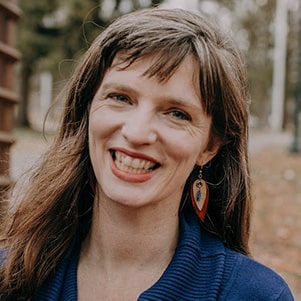 Alison Paul is the Vice President of Community Conservation at The Conservation Foundation, a nonprofit aimed at improving the health of communities by preserving and restoring natural areas and open space, protecting rivers and watersheds, and promoting environmental stewardship. She is a passionate environmental advocate with decades of experience in environmental science and social justice. Alison has worked in human rights and community-based conservation and has spent over a decade with the Field Museum in Chicago before joining The Conservation Foundation. She is pivotal in fostering partnerships and programs that connect people to land, health, and community, emphasizing inclusivity and sustainable practices.
Alison Paul is the Vice President of Community Conservation at The Conservation Foundation, a nonprofit aimed at improving the health of communities by preserving and restoring natural areas and open space, protecting rivers and watersheds, and promoting environmental stewardship. She is a passionate environmental advocate with decades of experience in environmental science and social justice. Alison has worked in human rights and community-based conservation and has spent over a decade with the Field Museum in Chicago before joining The Conservation Foundation. She is pivotal in fostering partnerships and programs that connect people to land, health, and community, emphasizing inclusivity and sustainable practices.
Here’s a glimpse of what you’ll learn:
- [1:07] Alison Paul shares her journey in environmental conservation and the linkage between social issues and environmental conservation efforts
- [5:42] The history of The Conservation Foundation and its mission to protect green spaces through community engagement
- [8:53] Empowering individuals and businesses to foster conservation efforts through innovative programs like Conservation at Home
- [13:48] Why it’s important to make fresh, healthy food accessible
- [15:40] How outdoor conservation activities impact mental health
- [20:13] Alison discusses the challenges of remaining inclusive, relevant, and impactful in changing demographics within environmental organizations
- [25:14] The Conservation Foundation’s membership and volunteer opportunities
In this episode…
The intricate relationship between our local environments and societal well-being is often underestimated, yet it is key to fostering healthier communities. By recognizing the profound impact of nature on public health, how can we unlock innovative strategies for enhancing community resilience? Could embracing our environmental roots ignite a journey to unite individuals for the greater good?
An experienced environmental advocate and nonprofit leader, Alison Paul delves into the inspiring world of creating positive change through environmental efforts. She shares her compelling narrative of growing up with a profound connection to nature and how this evolved into a lifelong commitment to social justice and conservation. She discusses The Conservation Foundation’s initiatives, efforts to make healthy, locally-grown food accessible, and the challenge of staying true to a mission of inclusivity in a world of ever-changing demographics. With her passion and expertise, Alison illustrates how environmental work is linked to fostering healthier communities and individuals.
In this episode of the Mission Matters Podcast, Paul Feith interviews Alison Paul, Vice President of Community Conservation at The Conservation Foundation, about connecting communities with the environment. Alison discusses the linkage between social issues and environmental conservation efforts, The Conservation Foundation’s mission to protect green spaces through community engagement, and the challenges of remaining inclusive, relevant, and impactful in changing demographics.
Resources mentioned in this episode:
Quotable Moments:
- “Getting your hands in the dirt connecting with people is where meaningful connections happen.”
- “We have to have healthy land and water to have healthy people, and it’s all connected.”
- “Nature can be that third space, where you can connect with yourself, others, and the place where you live.”
- “I think it’s taking that time to get outside, enjoy the outdoors, enjoy it with someone you love, or use it as a way to get to know someone you haven’t met before.”
- “In a day and age where we spend so much of our lives on screens, I find that making those connections in nature is more important than ever.”
Action Steps:
- Visit your local community green spaces and engage in hands-on activities like gardening or cleanup initiatives: Active participation fosters a deep personal connection with the environment and empowers individuals to take care of their local habitats.
- Create or transform your garden into a pollinator-friendly habitat using native plants: Supporting biodiversity in your own backyard contributes to ecological balance and provides crucial support for wildlife.
- Explore partnerships with local food programs that promote healthy, locally-grown foods: Collaborating with these initiatives helps address food accessibility issues and promotes community health.
- Participate in educational workshops that combine environmental conservation with wellness: These workshops often offer insights into sustainable living while improving mental and physical health through nature.
- Advocate for inclusivity and ongoing discussion around diversity and conservation in your community: Embracing different perspectives strengthens community bonds and ensures that conservation efforts benefit everyone.
Sponsor for this episode…
Today’s episode is sponsored by Paul Gregory Media, an 18-year-old digital marketing agency in downtown Naperville, Illinois.
They are one of the few thousand Certified B Corporations worldwide, demonstrating PGM as a leader of a global movement to use business as a force for good, meeting high standards of accountability, transparency, and community involvement. They have been trusted by hundreds of organizations since 2006.
PGM is recognized as one of the top marketing agencies in the region, earning more awards than many of its competitors combined. They have the passion, commitment, and expertise to get it done.
To learn more about the services PGM offers or how they can support you with your marketing needs, visit www.paulgregorymedia.com or email them at [email protected].






